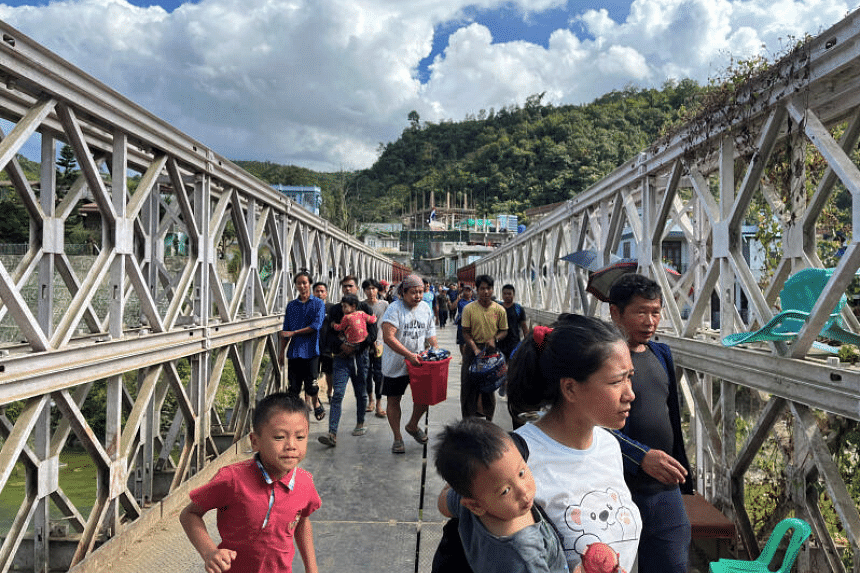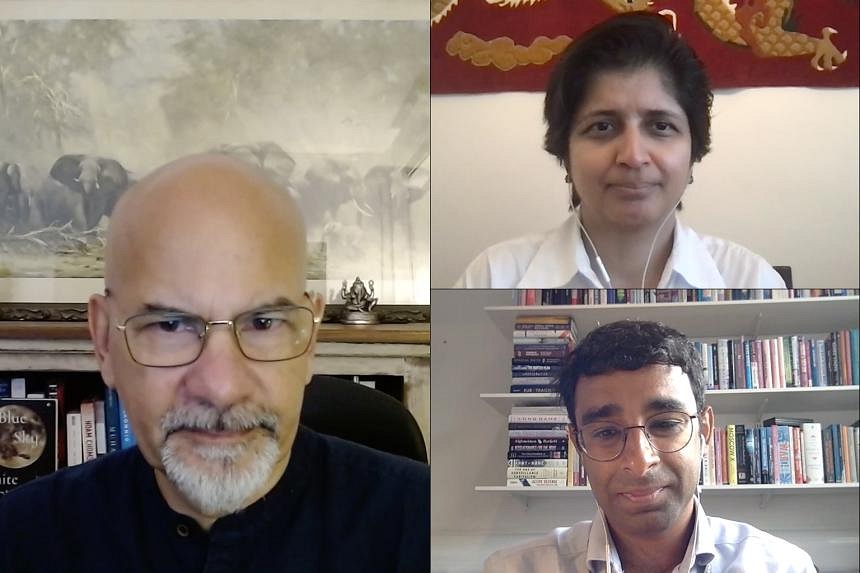Myanmar’s bloody, grinding civil war, with its outcome uncertain, has at least temporarily jeopardised India’s plans for connectivity to South-east Asia via its Act East policy.
Act East is a diplomatic initiative, launched in 2014, to promote economic, strategic and cultural relations with South-east Asia and the broader Asia-Pacific.
The Myanmar army’s February 2021 coup d’etat however, threw a giant spanner in the works.
Now New Delhi, with limited agency and influence over events in Myanmar, also has growing concerns over being outmanoeuvred and encircled by China in its near east, say foreign policy experts Dr Aparna Pande and Dr Avinash Paliwal in the latest episode of ST’s Asian Insider Podcast.
Dr Paliwal lectures at the School of Oriental and African Studies at the University of London, and this week released a 480-page book titled - India’s Near East: “A new history of India’s faltering attempts to exert control over its eastern hinterland and the neighbouring states of Bangladesh and Myanmar.”
Dr Pande, research fellow at the Hudson Institute in Washington, DC, has written several books on Indian foreign policy and South Asian geopolitics.
India’s foremost concern is conflict spillover into its own volatile north-east. A second concern is disruption to New Delhi’s Act East strategy which, over the last decade or so, had seen New Delhi invest heavily in road and port connectivity through Myanmar.
India’s relationships with regimes in Myanmar have been historically complex. But the current situation, with the military regime losing ground to armed resistance across the country, is of a different order of magnitude.
India is faced with the challenge of maintaining its relationship with the regime in Naypyidaw, while also maintaining tactical outreach, often covert in nature, with armed groups fighting the regime.
Meanwhile, notwithstanding historical suspicion of China on the part of Myanmar’s military elites, Beijing has succeeded in developing closer relationships in Myanmar.
Myanmar remains critical to India, Dr Pande noted in our podcast deep dive.
“Other countries can sanction Myanmar; they can ignore Myanmar, (but) India cannot afford to do that,” she said. “It learned the lesson when it... to some extent... ignored Myanmar in the 1970s and 1980s.”
“It had problems in the north-east. It wasn’t able to work with the junta against many of the insurgent camps - whereas since the 1990s, they’ve actually worked together and collaborated in some instances when India has crossed the border and worked with the Myanmar army against some insurgent groups.”
India sees its neighbours as its first layer of security, and has resented any external power influencing them, Dr Pande added. From India’s point of view, what New Delhi would like in any of its neighbours, including Myanmar, is a stable country that keeps India’s interests in mind.
But New Delhi has limited scope. “It will not be able to wean Myanmar away totally from dependence on China,” Dr Pande said. “India doesn’t have massive amounts of cash.. (and) while it does have a military relationship with the junta, there’s a limit to what India will provide the junta, vis -a -vis what China and other countries will.”
“I think India still hopes that this will die down and that in some months or a year, they’ll be able to move ahead on some fronts. I don’t see India giving up on something which matters so much for India’s connectivity.”
“As long as the (Myanmar) junta believes that India is an option to balance against China, I think to some extent, India’s policy would succeed,” she said.
Dr Paliwal chimed in: “I broadly see this as a defensive strategy.
“Myanmar is not a country in which India has historically enjoyed excess capabilities, whether it’s diplomatic, whether it’s material, whether it’s political. And when you adopt a defensive strategy, it effectively means a degree of political conservatism, wherein you invest and continue to invest in the junta... despite knowing that the coup in 2021 caused the current crisis.”
India would ideally like to see a restoration of electoral politics, if not liberal democracy in Myanmar, he said.
“But short of that, it must not cut the channels that it has built with the junta,” he added.
Worry about China’s growing influence on India’s eastern flank, also extends to Bangladesh, Dr Paliwal noted.
The Dhaka Metro was built by China. And notwithstanding Bangladesh Prime Minister Sheikh Hasina’s close ties to India, there remains latent anti-India sentiment in Bangladesh, and growing Chinese influence, as Bangladesh gets a significant portion of its military hardware from China.
All these factors, plus its own internal political dynamics, feed worries in New Delhi.
Follow Nirmal Ghosh on X: https://str.sg/JD7r
Read Nirmal Ghosh’s articles: https://str.sg/JbxG
Register for Asian Insider newsletter: https://str.sg/stnewsletters
Produced by: Nirmal Ghosh (nirmal@sph.com.sg) and Fa’izah Sani
Edited by: Fa’izah Sani
Follow Asian Insider with Nirmal Ghosh every fourth Friday of the month here:
Channel: https://str.sg/JWa7
Apple Podcasts: https://str.sg/JWa8
Spotify: https://str.sg/JWaX
Feedback to: podcast@sph.com.sg
---
Follow more ST podcast channels:
All-in-one ST Podcasts channel: https://str.sg/wvz7
ST Podcast website: http://str.sg/stpodcasts
ST Podcasts YouTube: https://str.sg/4Vwsa
---
Get The Straits Times’ app, which has a dedicated podcast player section:
The App Store: https://str.sg/icyB
Google Play: https://str.sg/icyX



